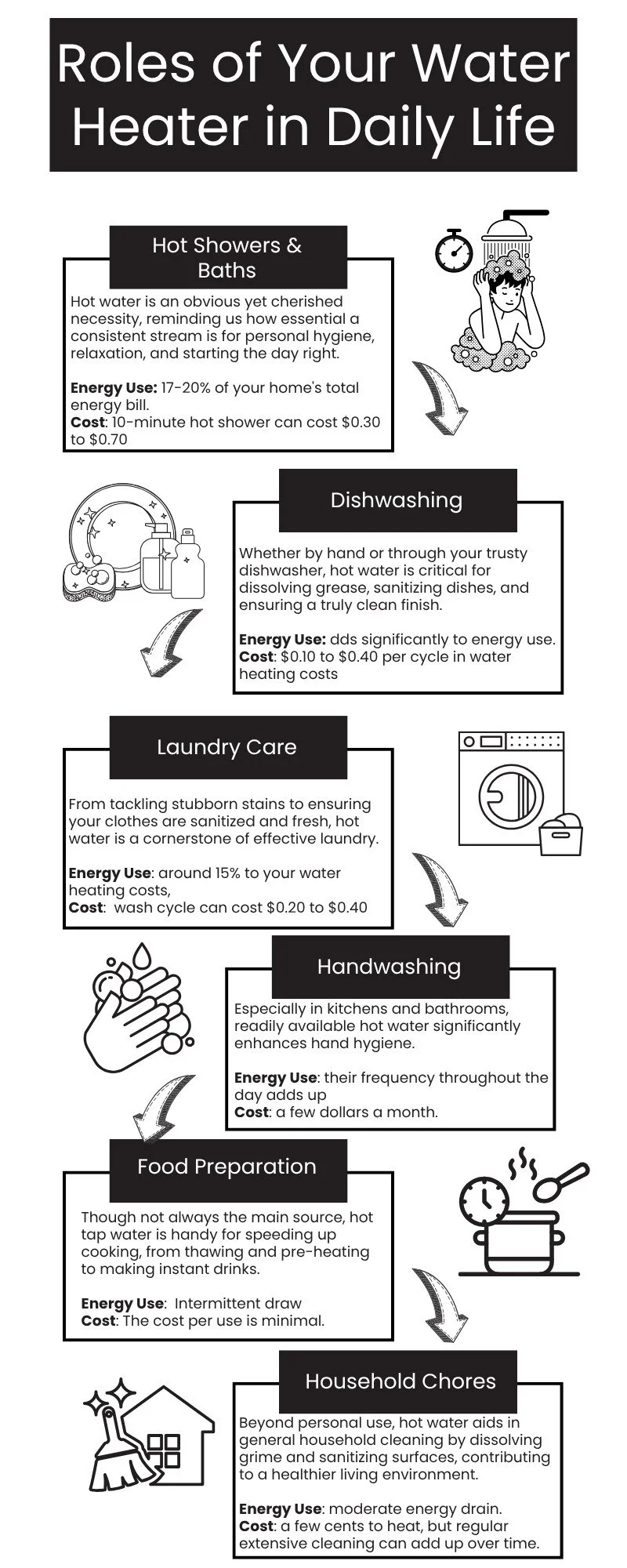Water Heater Replacement Cost: What Homeowners Need to Know
Water heater replacement cost isn’t one of those things you Google unless your current one’s already giving side-eye—or has straight-up quit on you. And if you're here, chances are you’re either mid cold-shower crisis or trying not to end up there. Either way, you’re smart to pause before throwing money at the first guy with a wrench and a wild estimate.
Here’s what no one’s blunt enough to say: water heaters don’t just “break.” They ambush. And what it takes to replace one—from labor to permits to parts you didn’t know existed—can make your credit card sweat harder than you do.
In this guide, we’re cutting through the fluff: exact price ranges, what messes with your total, what type of heater actually fits your setup, and how not to get financially rinsed.
What You’ll Actually Pay: Average Water Heater Replacement Costs
Let’s not pretend there’s a universal number. “Average” is what people quote when they want you to stop asking questions. But you should ask. Especially if you’re not in the mood to overpay for the most unsexy thing in your house.
Here’s what you’re realistically looking at when replacing a new water heater, assuming the plumber isn’t playing bingo with your budget:
Basic tank system (electric or gas): $800–$2,500 (fully installed, assuming your walls aren’t hiding plumbing sins)
Tankless upgrade: $1,200–$3,500—but don’t flinch just yet; there’s nuance
Labor alone: $300–$1,000 depending on zip code, access, and how cranky the crawlspace is
Extras (and they’re not optional):
Permit fees: $50–$200
Old unit disposal: $50–$150 (because, no, they don’t take it “as a courtesy”)
Pipe rewiring or gas line rerouting: $100–$500, depending on how bad your last installer was
You can verify every one of those numbers with sources like HomeGuide, This Old House, and HomeAdvisor. Or, you can try not verifying them and learn the hard way. Your call.
In short: unless you’re getting a garage-sale deal from someone whose tools are zip ties and hope, plan for $1,500–$3,000. That’s the sweet spot for a professionally installed unit by top-rated plumbing services that actually warranty their work.
Let’s move on to what swings those numbers up or down (because oh boy, it swings).
Factors Affecting Water Heater Replacement Cost
So you got a quote. Then the final invoice shows up and it reads like an entirely different conversation. Sound familiar? That’s because most people underestimate what actually affects water heater replacement cost.
Here’s what really drives it:
1. The Type of Heater You Picked (Or Had Picked For You By a Sales Bro)
Tank units are cheaper but bulkier. They just sit there like couch potatoes, heating 40 gallons 24/7 whether you're home or not.
Tankless models only heat water when you need it—which is energy-smart—but they demand a more elaborate install (hello, pipe upgrades).
Gas or electric matters too. Gas water heater maintenance can be more involved, but electric units sometimes need electrical panel upgrades. Either one can be fine—until your house says otherwise.
Heat pump and hybrid systems cost more upfront, but the efficiency is no joke. If your electric bill is already giving you stress dreams, this is worth looking into.
2. Size Isn’t Just for Bragging
50-gallon units can cost significantly more than 30-gallon ones. But choosing the wrong size leads to either lukewarm regret or overspending. So unless you enjoy doing math while dripping wet, get a water heater inspection cost quote that includes sizing advice.
3. Where It’s Installed (Yes, Your House Layout is Taxing You)
Heaters in basements? Easier access, less labor. Tucked into attics, crawlspaces, or tiny closets? Expect a labor fee hike. Installers don’t love doing yoga in your utility room.
4. Permits and Codes: The Tax You Didn’t See Coming
Depending on where you live, you might need:
A venting upgrade
Earthquake straps (California)
A shutoff valve replacement
Even a new expansion tank
Miss one, and not only are you breaking code—you’re breaking your chance at warranty coverage. And that’s assuming the city inspector doesn’t fine you for skipping the $100 permit.
5. Retrofits Are Where Budgets Go To Die
Switching from a tank to tankless means:
New gas lines
Condensate drains
Potential electrical rewiring
Upgraded venting
Suddenly your $1,200 install is eyeing $3,800. That “simple upgrade” is not always simple. You’d want top-rated plumbing services with retrofit experience, not someone YouTubing from your attic.
Know What You're Walking Into
Before you freak out, here’s the good news: there are ways to find affordable water heater replacement cost solutions—but it starts with knowing these variables. No two homes are identical. And no quote should be either.
Do this:
Ask what parts of the quote are flexible
Request breakdowns on labor vs materials
Ask whether they’ll service water heater brands you already own
Get gas water heater maintenance info upfront (you’ll need it, eventually)
And please: if someone’s giving you a too-good-to-be-true flat rate without inspecting your setup, assume it’s too good. Then call us. Or literally anyone who knows how to spell “permit.”
Types of Water Heaters & What They’ll Make You Pay (or Save)
It’s one thing to say “I need a water heater.” It’s another to pick one without second-guessing yourself for the next 10 years. Because the water heater replacement cost you see on the quote is just the appetizer. The main course depends entirely on what kind of unit you just signed up to babysit.
1. Storage Tank Water Heaters
The trusty, thirsty classics.
Cost (Unit + Labor): $800–$2,500
Why people still buy them: They’re cheaper up front and just about every plumber on the continent knows how to install one.
You’re heating 40+ gallons all day, every day. Even when no one’s home. This is financially clingy. Also, they tap out in 8–12 years like clockwork.
If you're okay replacing it a couple more times over the next few decades, fine. But don’t call it a “bargain” without factoring in that utility bill.
2. Tankless Water Heaters
Because nothing says “I like control” like hot water on command.
Cost (Unit + Labor): $1,200–$3,500
Why people like them: Smaller footprint. Only heats when needed. Some models last 15–20 years.
This isn’t plug-and-play. You’ll need proper venting, maybe upgraded gas lines, possibly new circuits—hence the spike in tankless water heater maintenance cost down the line if you skip proper setup.
If someone tells you installation will be “straightforward,” ask how long they’ve been in denial.
3. Hybrid / Heat-Pump Water Heaters
The nerdy overachievers of the group.
Cost (Unit + Labor): $1,700–$4,200
What’s good: They pull heat from the air to warm your water—super efficient. Good for eco-cred.
But they need space and a warm-ish climate. You can’t shove one into a tiny closet.
They’re great—if your home is a match and you don’t mind the price of admission.
4. Solar Water Heaters
When you’re committed to the planet and spreadsheets.
Cost (Unit + Labor): $3,000–$7,000
The upside: Nearly zero operating costs. Some states offer rebates that bring that initial pain down.
If your region has more “cloud season” than sun days, you’ll need a backup heater.
High commitment. High reward. But definitely not a “set-it-and-forget-it” scenario.
Maintenance: The Thing That Either Saves You or Silently Wrecks Your Heater
Look—how to maintain water heater systems isn't just for DIY Reddit forums or bored homeowners. This stuff directly decides whether you get 10 years from your unit… or a premature call for replacement. And trust us, your water heater maintenance cost will feel like nothing compared to a full reinstall bill.
Here’s what actually matters.
Annual Maintenance Checklist (Yes, You Do Need One)
1. Flush the Tank (or Tankless) Once a Year
Clears out sediment buildup
Restores heating efficiency
Takes about 30–60 minutes, and can cost $20–$50 if you DIY
2. Replace the Anode Rod (Every Few Years)
This thing sacrifices itself to protect your tank
If it’s gone, the tank starts rusting
About $20–$40 to replace
3. Pressure Relief Valve Check
Prevents explosions. Yes, actual ones.
Should open and close easily
No movement? Replace it.
Too busy to bother? Totally fair. A licensed plumber can service water heater units annually for $100–$300 depending on where you live. That’s your basic water heater maintenance cost, and it’s cheaper than getting flooded at 3 a.m.
How Maintenance Impacts Replacement Cost
Neglect cuts lifespan by years. Not maybe—definitely.
Tankless heaters need regular flushing and vent checks or they get gummed up faster than you’d think.
Energy usage spikes without routine maintenance—so even if the heater doesn’t break, your power bill might start trying to break you.
We’re not just talking “you should probably do this.” We’re saying you either keep up with maintenance or you write “$2,000” on a sticky note and slap it on your calendar—because that’s what’s coming.
Red Flags That You’re Too Late (and Headed for a Quote)
Loud popping, sizzling, or rumbling
Rusty or murky water
Water pooling under or around the unit
It’s older than your car and smells like it
These are the last gasps. At this point, your next Google search should be for affordable water heater replacement cost solutions—not DIY hacks.
The Honest Deal
Regular checkups = longer life = delayed expenses. This isn’t complicated. How to maintain water heater systems properly is something every homeowner should know—or at least schedule.
Skip it, and the water heater replacement cost you were trying to delay will show up anyway. Only louder. And probably while you’re already stressed about something else.
Saving on Your Water Heater Replacement (Without Doing Anything Dumb)
The worst time to figure out how to save money on a water heater is after the old one floods your floor. The second-worst time is right before the installer rings your doorbell. So let’s do better than that.
Here’s where the smart money wins, quietly.
1. Stop Accepting the First Quote Like It's Gospel
You’re not buying a sandwich. You’re paying thousands for a device that decides whether your mornings suck. Get at least three quotes from licensed, insured, top-rated plumbing services. You’ll spot pricing games and shady upcharges fast. Anyone who resists detailed breakdowns isn’t doing you a favor—they’re betting you won’t ask questions.
2. Don’t “Size Up” Like You’re Buying a Mattress
More gallons doesn’t mean better. It means higher bills and slower recovery time. But undersized heaters are no prize either—they’ll leave your second shower lukewarm and your mood worse. The goal is right-size, not upsell. If your plumber isn’t asking about your actual usage, they’re selling you the most expensive guess they have.
3. Chase Rebates Like It’s Your Job
ENERGY STAR units often qualify for rebates that cut hundreds off your total bill. Energy.gov lists active state programs, and most utility providers post them clearly. But they’re time-limited and often under-used. Don’t assume your plumber will tell you. Ask. Demand paperwork if needed.
4. Regular Maintenance = Delayed Expense
You know what isn’t affordable? Replacing a heater that only failed because it wasn’t maintained. Regular flushing, valve checks, and water heater annual maintenance cost of $100–$300 prevent full-blown replacements. Even a $200 water heater repair cost is a good trade if it gets you another three years.
5. Schedule the Replacement—Don’t React to It
Every emergency install costs more. It’s called “after-hours” for a reason. Parts cost more. Labor costs more. Options shrink. Control is gone. The smartest homeowners replace before the breakdown—not after.
So if your heater is over 10 years old and sounding like a bad attitude in a metal tank, schedule a quote now. Not later. Not “when it gives out.” Now.
Conclusion
So now you’ve seen what affects your water heater replacement cost—unit type, labor, location, permits, maintenance history, and whether you were rushed into an emergency install without a shred of context.
You’ve also seen how to spend less without cheaping out, and how water heater annual maintenance cost plays a critical role in long-term savings. Ignoring those little upkeep tasks is how people end up searching “water heater repair cost” after dinner instead of enjoying their evening.
But if you take action early—compare smart quotes, schedule checks, avoid emergency installs—you’ll be setting yourself up for something few homeowners actually have when it comes to plumbing: control.
If you want straight answers, fair pricing, and work done by top-rated plumbing services who explain what they’re doing without condescending tech talk? That’s what we’re here for.
Get in touch. Let’s quote it right the first time—and make the last replacement the smartest one you’ve ever made.
Frequently Asked Questions
-
A: Replacing a 50-gallon water heater typically costs between $1,200 and $2,500, including the unit, labor, permits, and disposal. The final price depends on factors like fuel type, installation location, and whether any upgrades are required to meet code.
-
A: A new water heater unit alone can range from $400 for basic tank models to over $2,500 for high-efficiency tankless systems. Prices vary based on type, size, brand, and energy rating.
-
A: Professional water heater servicing costs between $100 and $300, depending on the unit type and the scope of the maintenance. Tankless models may cost more due to descaling and vent checks.
READ MORE…
8 Common Water Heater Problems: A Homeowner’s Guide
How Does Plumbing Work? What Your Plumber Knows That You Don't



